Welcome to the Wednesday, Sept. 17, Brew.
By: Briana Ryan
Here’s what’s in store for you as you start your day:
- This year’s Virginia House of Delegates elections could affect the outcome of three proposed constitutional amendments
- Thirty-five members of Congress have announced they will not seek re-election in 2026
- A comprehensive look at 135 years of ballot measures in South Dakota
This year’s Virginia House of Delegates elections could affect the outcome of three proposed constitutional amendments
This year's House of Delegates election in Virginia could decide the fate of three proposed state constitutional amendments that the Democratic-controlled General Assembly approved this session.
One would remove a constitutional ban on same-sex marriage, one would create a "right to reproductive freedom", and one would allow individuals convicted of a felony to vote after their release from incarceration.
The constitutional amendment process in Virginia requires four steps. The proposed amendments have all completed the first step. Here's the full process:
- A simple majority of both the state House and Senate approves an amendment
- There must be an election for the state House (all 100 House seats are up for election every two years)
- A simple majority of both the state House and Senate approves an amendment for a second time
- Voters decide on an amendment in a statewide election.
Virginia is one of nine states that require approval in two separate legislative sessions before a proposed amendment is placed on the ballot for voters to decide. An additional four states require approval during one or two successive legislative sessions, depending on whether the amendment receives a simple majority or supermajority.
Between the 2010 and 2024 legislative sessions, states with two-session vote requirements approved 132 constitutional amendments during one legislative session, ultimately sending 85 (64.4%) amendments to voters.
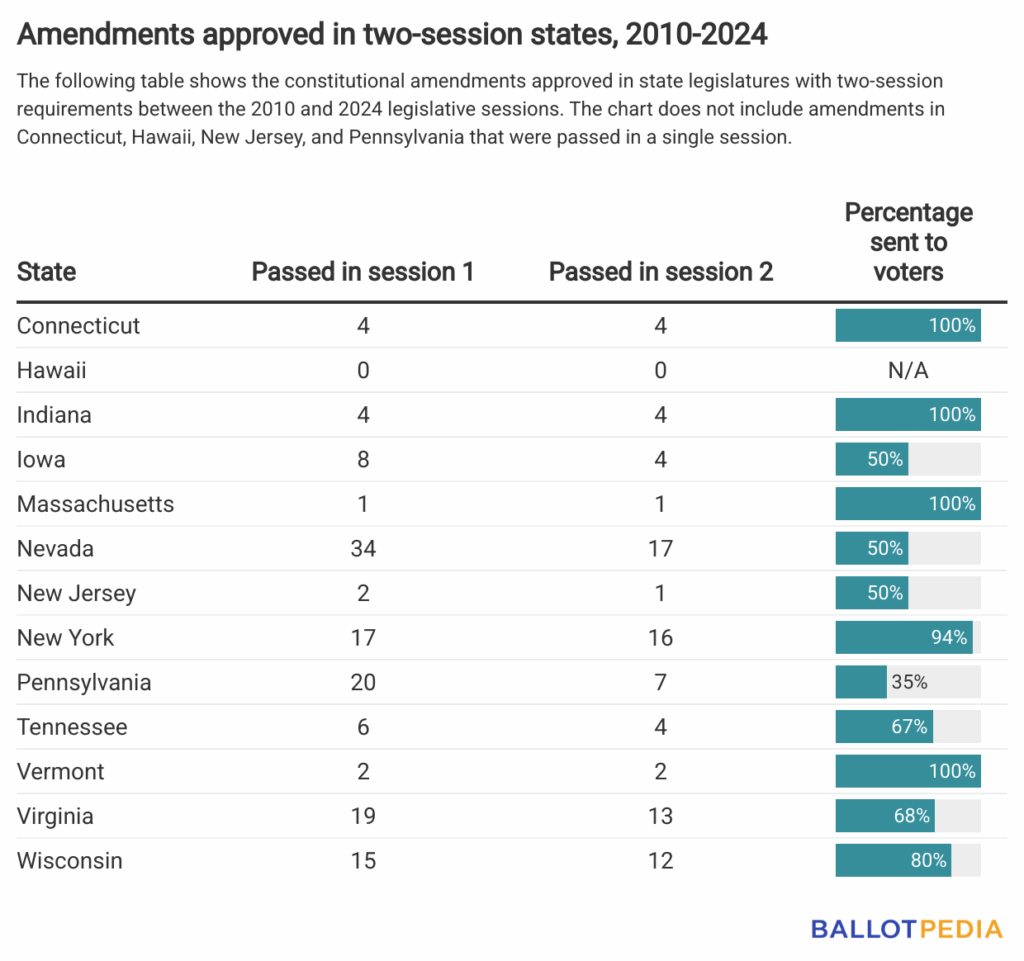
Nationwide, a lower percentage of amendments made it to voters if party control changed between sessions. Between 2010 and 2024, 19% (4 of 21) of amendments in legislatures that changed party control between sessions made it to the ballot.
All 100 districts in the state House are up for election on Nov. 4, while no districts are up for election in the Virginia Senate. Democrats have a 51-49 majority in the state House, and a 21-19 majority in the state Senate. The state House has changed partisan control in every election since 2019.
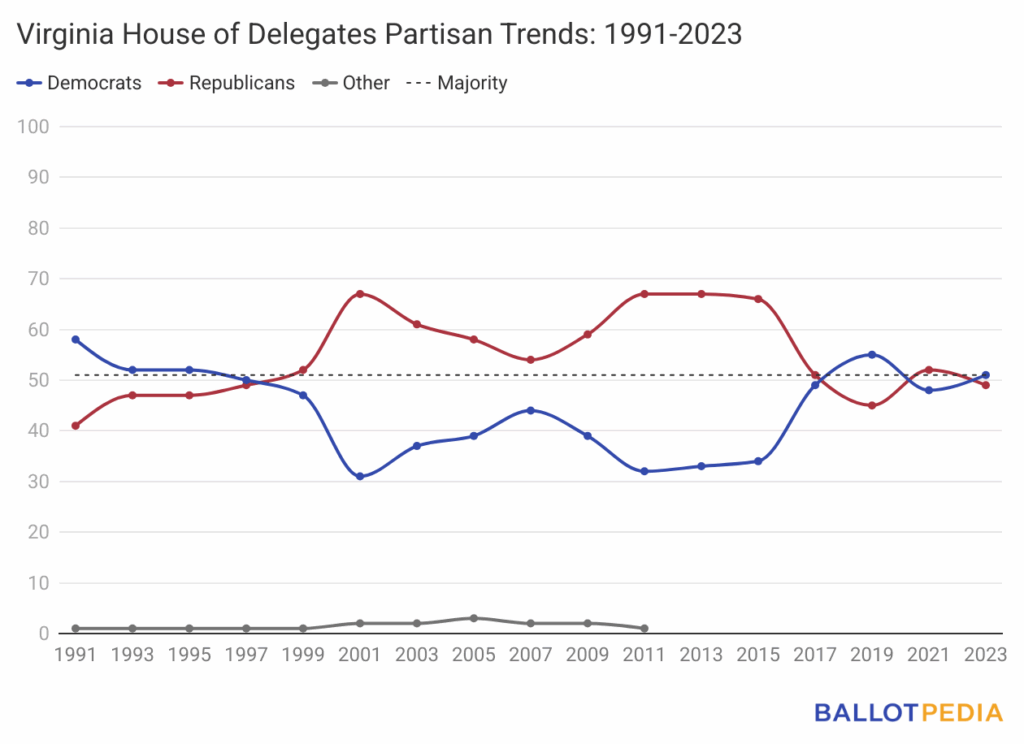
An overview of Virginia's proposed amendments
The Remove Constitutional Same-Sex Marriage Ban Amendment would overturn a state constitutional amendment that says marriage is only between one man and one woman. The proposed amendment also says that Virginia will not deny the issuance of a marriage license to two adults seeking a lawful marriage based on their sex, gender, or race.
On Jan. 21, the state Senate passed SJR 249 24-15. Twenty-one Democrats and three Republicans voted yes, and 15 Republicans voted no. One Republican was absent or otherwise not voting. The state House approved it 58-34 on Feb. 13. Fifty-one Democrats and seven Republicans voted yes, and 34 Republicans voted no. Eight Republicans were absent or otherwise not voting.
The Right to Reproductive Freedom Amendment would establish a right to "reproductive freedom", defined as the "right to make and effectuate one's own decisions about all matters related to one's pregnancy."
On Jan. 21, the state Senate passed SJR 247 21-19. Twenty-one Democrats voted yes, and 19 Republicans voted no. The state House passed it 51-46 on Feb. 13. Fifty-one Democrats voted yes and 46 Republicans voted no. Three Republicans were absent or otherwise not voting.
The Voting Rights Restoration for Felons Upon Release Amendment would allow individuals convicted of a felony to vote following their release from incarceration. On Jan. 21, the state Senate passed SJR 248 21-18. Twenty-one Democrats voted yes, and 18 Republicans voted no. One Republican was absent or otherwise not voting. The state House passed it 55-42 on Feb. 13. Fifty-one Democrats and four Republicans voted yes, and 42 Republicans voted no. Three Republicans were absent or otherwise not voting.
Click here to read more about these proposed amendments.
Thirty-five members of Congress have announced they will not seek re-election in 2026
Thirty-five members of the U.S. Congress—eight U.S. Senate members and 27 U.S. House members—have announced they will not seek re-election in 2026. That's the most announced retirements at this point in an election cycle since at least 2018.
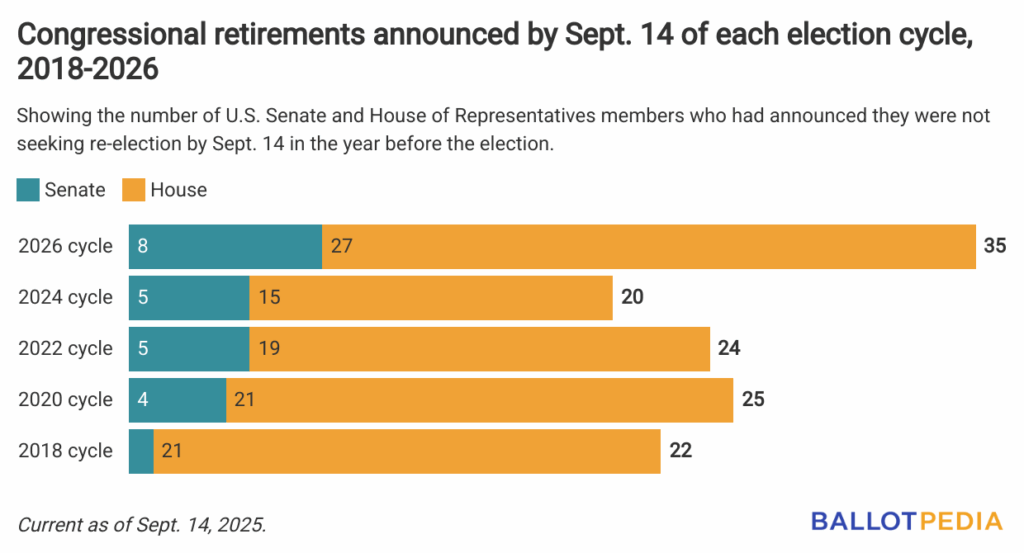
Since our Aug. 18 update, six U.S. House members and one U.S. Senate member have announced that they will not seek re-election in 2026. Here are the seven members who have announced their retirements since our last update, as well as how independent race forecasters have rated the 2026 general election for each district or seat these incumbents currently represent:
- Rep. Lloyd Doggett (D-Texas) announced on Aug. 21 that he will retire from public office. Race forecasters have rated the election as either Solid or Safe Democratic.
- Rep. Chip Roy (R-Texas) announced on Aug. 21 that he will run for attorney general of Texas. Race forecasters have rated the election as either Solid or Safe Republican.
- Rep. Jerrold Nadler (D-N.Y.) announced on Sept. 1 that he will retire from public office. Race forecasters have rated the election as either Solid or Safe Democratic.
- Sen. Joni Ernst (R-Iowa) announced on Sept. 2 that she will retire from public office. Race forecasters have rated the election as Likely Republican.
- Rep. Ashley Hinson (R-Iowa) announced on Sept. 2 that she will run for the U.S. Senate in Iowa. Race forecasters have rated the election as either Solid or Likely Republican.
- Rep. Morgan Luttrell (R-Texas) announced on Sept. 11 that he will retire from public office. Race forecasters have rated the election as either Solid or Safe Republican.
- Rep. Michael McCaul (R-Texas) announced on Sept. 14 that he will retire from public office. Race forecasters have rated the election as either Solid or Safe Republican.
U.S. House
Twenty-seven members of the U.S. House—10 Democrats and 17 Republicans—will not seek re-election in 2026. Of the 27 members not seeking re-election:
- Eight—five Democrats and three Republicans—are retiring from public office.
- Ten—five Democrats and five Republicans—are running for the U.S. Senate.
- Eight—all Republicans—are running for governor of their respective states.
- One Republican is running for attorney general of Texas.
At this point in the last four election cycles, there were 15 retirement announcements in 2024, 19 in 2022, 21 in 2020, and 21 in 2018.
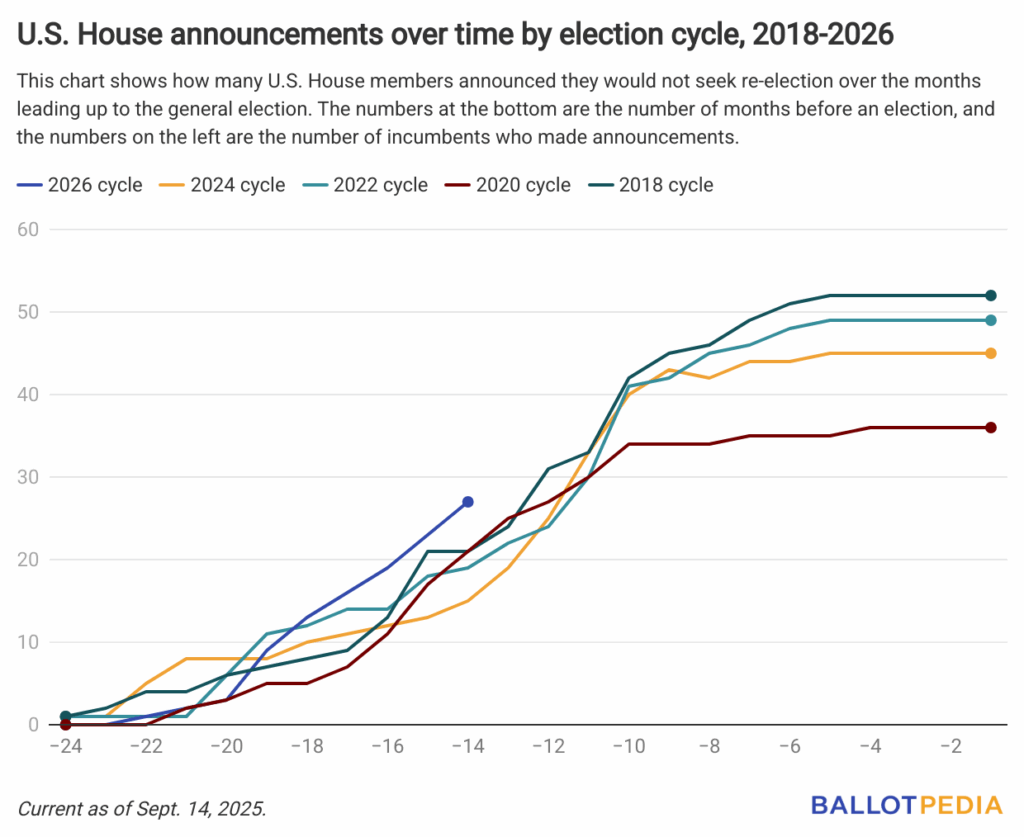
U.S. Senate
Eight members of the U.S. Senate—four Democrats and four Republicans—announced they will not seek re-election in 2026. In addition to Ernst, Sens. Thom Tillis (R-N.C.), Dick Durbin (D-Ill.), Mitch McConnell (R-Ky.), Jeanne Shaheen(D-N.H.), Tina Smith (D-Minn.), and Gary Peters (D-Mich.) are retiring from public office. Sen. Tommy Tuberville (R-Ala.) is running for governor of Alabama.
At this point in the last four election cycles, there were five retirement announcements in 2024, five in 2022, five in 2020, and one in 2018.
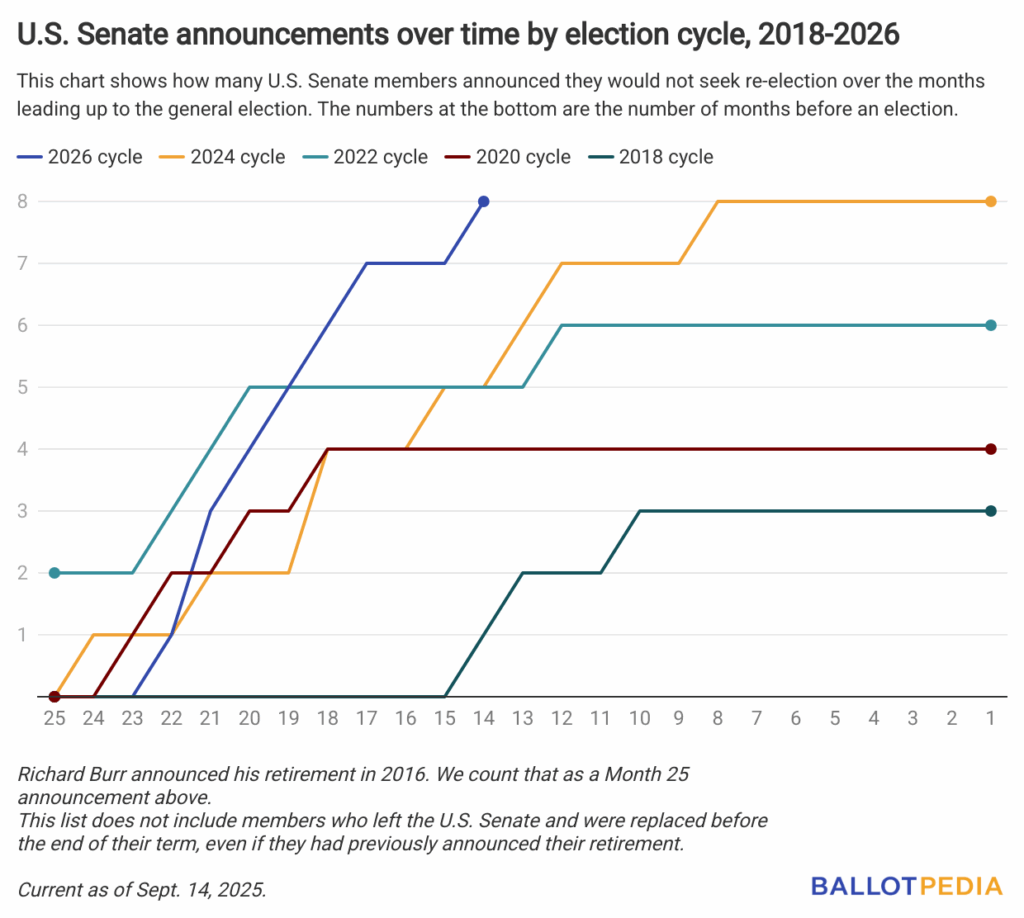
Click here to read more about members of the U.S. Senate who are not seeking re-election in 2026, and here for more about members of the U.S. House who are not seeking re-election in 2026.
A comprehensive look at 135 years of ballot measures in South Dakota
Ballotpedia's Historical Ballot Measure Factbook will document nearly 200 years of direct democracy in the United States. This ongoing research effort will provide an unparalleled resource for researchers, reporters, and the public on how ballot measures have evolved, the issues they have covered, and their role in our civic life.
Today, let's look at historical ballot measures in South Dakota. Our comprehensive inventory of South Dakota ballot measures spans from 1889 to 2024. In that time, South Dakota voters decided on 366 measures, approving 160 and defeating 206—a 44% approval rate.
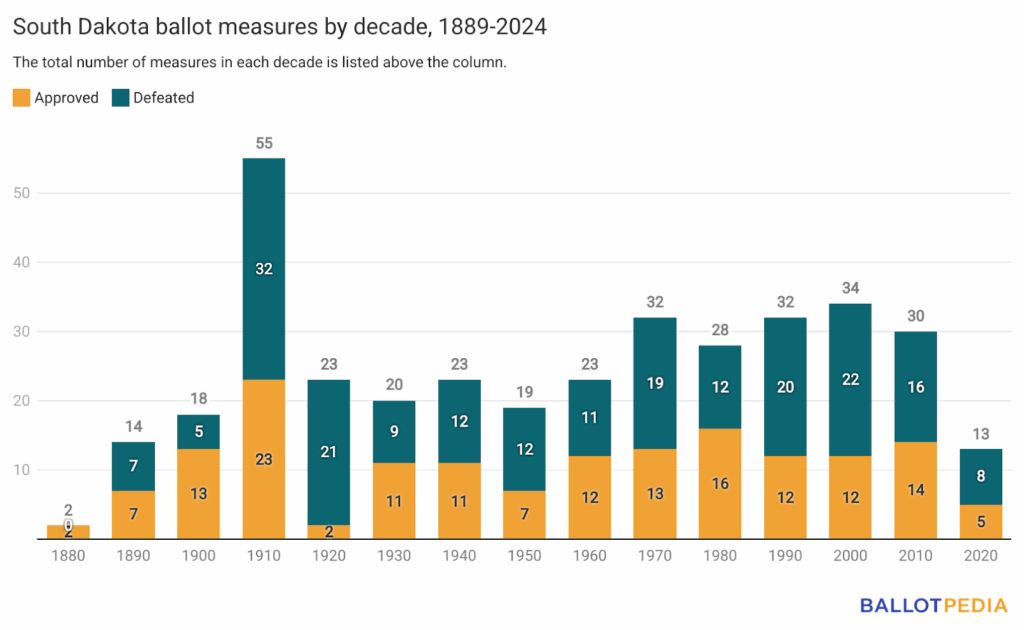
Of the 14 states for which we have completed Factbooks, South Dakota has the lowest approval rate, and Texas has the highest, at 75%.
South Dakota ballot measures have addressed 131 unique topics. The most common topics are related to public education funding (38 measures), property taxes (24 measures), and business regulations (24 measures).
Here is a selection of important and interesting measures from South Dakota:
- South Dakota was the first state in which voters decided on the initiative and referendum process. In 1898, voters approved an amendment establishing the process.
- South Dakota voters decided on women's suffrage seven times—the most of any state. The first six times, voters rejected women's suffrage amendments, the first appearing on the ballot in 1890. Voters approved an amendment granting women the right to vote in 1918.
- Voters approved a right-to-work measure in 1946, which included the right-to-work in the state Bill of Rights.
- Voters in the state decided on marijuana six times. In 2020, voters approved medical marijuana after rejecting it twice in 2006 and 2010. In 2020, voters also approved the legalization of recreational marijuana. However, this measure was overturned in 2021, with a Circuit Court ruling that the measure violated the state's single-subject law. Voters rejected the next two attempts to legalize marijuana in the state in 2022 and 2024.
- Voters approved an amendment expanding Medicaid in 2022. This amendment required the state to expand Medicaid to adults between 18 and 65 with incomes below 138% of the federal poverty level.
Click here to view our full Historical Ballot Measure Factbook for South Dakota, and here for a full list of completed Historical Ballot Measure Factbook.

